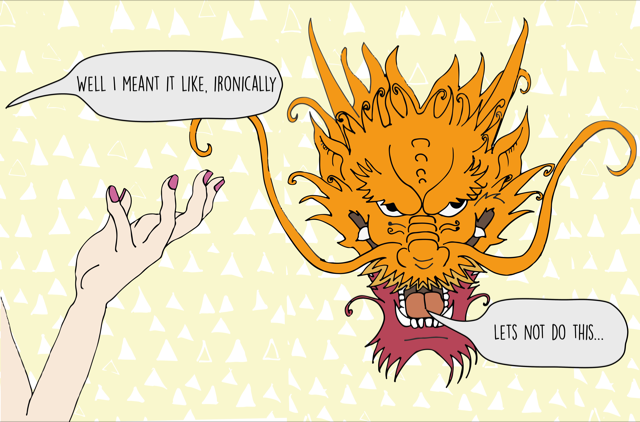
Ever had a white person offend you, only to have them defend themselves by crying “it was ironic!”? It has happened to me too many times. That feeling of discord from being personally insulted to the sudden guilt of putting them in a bad light is unnerving, especially for someone already anticipating their next racist experience.
Satire is a great and versatile tool in the creative community and in social situations. It’s helped me to understand the autonomy I have over my identity. However, satire has also become a warrant for general derogatory language, and couching racism in comedy doesn’t make it any less racist.
Recently, I was told that I was “so Asian” because I was worrying about my university work and talked about my strong desire to study. When the person sensed my anxiety towards this remark and its condescending undertone, he defended himself by claiming allyship, asserting that the ironic intention behind the joke was proof that I shouldn’t have been offended. He insisted that he was “making fun of actual racists”.
“If my ‘classic Asian traits’ weren’t tokenised…then crude slurs, such as ‘fucking chink’, were used to degrade me”
This made me think of previous times when people, including friends, have echoed similar remarks. If my “classic Asian traits” weren’t tokenised, like my shyness or the fact that I play piano, then crude slurs, such as “fucking chink”, were used to degrade me. Nevertheless, I am told that it’s not real racism, since these comments were never said “seriously”. I am pressured to accept that the alleged comedian could never be racially offensive because they are “liberal-minded and woke.” I am compelled to conform to their rules on racism. My hurt and discomfort are totally brushed under the carpet in order to protect the white person’s ego.
White people don’t get to choose what is acceptable, on whatever level, when it comes to racism. Regardless of irony, you have neither the right to call me “yellow” or “a little chink”, nor the permission to joke about my exoticness.
Being white, you’ve already been granted the space and comfort of a society that has been constructed to protect your ego. White supremacy is pretty universal; travelling from west to east and north to south. And although things have progressed, the majority of people, at least from experience, still hold internally racist opinions. People of colour living as minorities in white-dominated countries still experience the reality of racism on a daily basis. Often, you’re inescapably aware of your foreignness — something that white people will never experience. The least we deserve is to own the use of satire to process the racism we continuously experience, without white people trying to claim it as theirs.
“White people don’t get to choose what is acceptable, on whatever level, when it comes to racism”
If I want to, I should be able to make an ironic joke about being a submissive lotus dragon, or how all East Asians speak ching chong, to mock the horribly reductive stereotypes imposed on us. I should be able to discuss the racist shit that white people say without having to add on the insultingly obvious “not ALL white people”. I should be able to do all of this without worrying that white people might imitate this humour, and in doing so, deprive the humour of its meaning.
Satire, in the context of a marginalised race, exists for those who need it. What makes it funny is the dark comedy that arises from the person of colour’s performance. Whether they’re ridiculing white people or common perceptions of people of colour, or if they’re simply demonstrating the repetition and tedium of suffering racism. For people of colour, often satire provides the support we need to alleviate our racial alienation. So, when a non East Asian performs the same ironic slurs concerning my mother tongue or our so-called submissiveness, it feels like they’re taking over our space of relief. A space that should be dominated only by people who identify with such suffering; because only we truly know the pain of not being able to assimilate in a culture where whiteness is accepted as the inherent ideal.
“Satire is an interruption to the whitewashed narrative of our culture, not an opportunity for white people to emulate us”
Satire is an interruption to the whitewashed narrative of our culture, not an opportunity for white people to emulate us. As great as attempting to understand is, white people cannot truly relate to the awkward nature of racism. Satire is so useful for projecting the truth of this awkwardness to the external world, which, if left unexpressed, can become rather depressing. White people, in this situation, should simply listen and learn from what they’re receiving instead of trying to participate in it. While they can appreciate our humour, as good allies, white people must never appropriate it.
Post-colonial Britain tries to scare us into silence by deeming confrontation as an exposure of vulnerability. Satire is a way of confronting the racism people of colour are vulnerable to – and trusting in this vulnerability for the sake of healing and progressing. Satire is a space for self-validation, a place to stamp on all the prejudices we face. When untainted by white people, satire should empower people of colour who are tired of feeling like second-class citizens in their own country.









